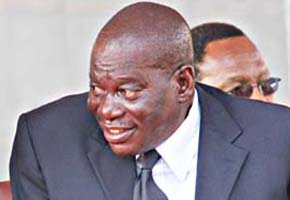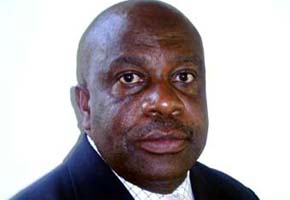‘Gen Mujuru unhappy with ZRP security’

“He told me that the officers were avoiding him and he wanted them changed, but he let them stay because they had only a few days left.
“Gen Mujuru was always concerned with security at the farm and at one time he told me that there was virtually no security at the farm and that we were actually guarding ourselves.”
Ms Short said when she asked the cops why they were always firing their guns, they told her that they wanted to scare those who might want to attack the farmhouse.
At times the policemen said they were firing at snakes.
Ms Short said relations between Gen Mujuru and the policemen further deteriorated when they severely assaulted a farm worker.
The worker, Ms Short said, was thrown into a ditch full of water after the assault and was only rescued by his wife.
He was taken to hospital where he was treated for the injuries.
The farm worker had apparently fought a workmate at the local bar.
Ms Short said the policemen were drunk when they assaulted the worker.
“Gen Mujuru asked them if they had carried out any investigations into the matter and they said they had not.”
“He wondered what type of police officers they were when they rushed to act without carrying out investigations.
“I used to give the policemen food when theirs had run out, but Gen Mujuru stopped me from doing so because he was not happy with the way they conducted their duties.”
Ms Short — who worked for Gen Mujuru since 2000 — said policemen who used to guard the farmhouse in the past would spend only 42 weeks at the farm.
But the three, who were on duty on the fateful night, had stayed longer.
Ms Short said there was nothing flammable in Gen Mujuru’s bedroom that could start a fire.
But Mr Chikwanha ordered the State to determine how flammable some of the items said to have been in the house were.
Ms Short said there were chemicals to treat livestock, kits for operating cattle, bottles of dish washing liquid, oven cleaner, window cleaner, scouring powder, toilet cleaner, candles, boxes of matches and petroleum jelly.
She confirmed that a bunch of keys found in the main bedroom after the fire was the bunch which Gen Mujuru kept, but said that Gen Mujuru had told her that he had left the keys in Harare when he asked her that night for her key to the kitchen door.
Ms Short did not know how the General’s keys were discovered in the bedroom when Gen Mujuru had told her that he did not have them.
A television set and malfunctioning air conditioners were the only electrical appliances in the main bedroom, she said.
Ms Short did not accept what other witnesses said, that the fire could have started in the geyser or the air conditioner.
Gen Mujuru, Ms Short said, did not smoke and kept neither matches nor a cigarette lighter. Ms Short was surprised to discover that Gen Mujuru did not lock doors to his car that night and left groceries in the vehicle.
“He never did that since I worked for him,” she said. “He never left his car open with groceries inside.”
Ms Short heard explosions during the night before Const Mark woke her to tell her that the house was on fire.
At first she thought the sounds were of gunfire because the cops used to fire their guns anytime, but Const Mark told her that the noise was from exploding asbestos sheets.
Ms Short said she did not talk about the sounds to the investigating police officers because she was overwhelmed by the events.
A security guard at the farm, Mr Samuel Lewis, said he also heard explosions before he teamed up with another guard at the next gate to go to the main house to investigate.
He heard from those at the main house that it was the asbestos sheets that were exploding.
Mr Lewis said he saw Gen Mujuru around 8pm alone in the car when he left to visit the nearby shops.
Gen Mujuru returned to the farmhouse alone.
Mr Lewis raised laughter in the courtroom when he said he ran more than 300 metres in half a minute.
The 13th witness, Ernest Nyamanja, a security guard at the late general’s shop since 2002, said he met him on the night of the inferno.
“I saw the General at around 8pm at the gate leading into the shop premises and I spoke to him and he told me that he wanted to go to Rosy’s (Ms Short’s) place,” he said.
Mr Nyamanja opened the gate and the General went to the maid’s house before returning in about five minutes.
Asked by Ms Sharon Fero of the Attorney General’s Office, who was leading the evidence, on Gen Mujuru’s state of sobriety, Nyamanja said he did not look drunk and was in his normal senses.
“After sometime, police details who came from the direction of the General’s house approached me and told me that Gen Mujuru’s house was on fire,” he said.
“I asked the policeman whether he (Gen Mujuru) had come out of the house, but he told me that he had not come out.”
The security guard said he suggested to the policeman that it followed that Gen Mujuru had been burnt inside the house.
The policeman, he said, told him that he was not aware of the state of Gen Mujuru given that the house was on fire.
Asked by the Mujuru family lawyer Mr Takor Kewada whether he heard any noise from the farm house, Nyamanja said: “I heard sound of something bursting but I could not tell what it was given the considerable distance (from the shop to Mujuru residence).”
Another witness Ms Apronia Chitashu, a shopkeeper at the farm who said Gen Mujuru was her uncle, said she went to bed at 9pm on August 15.
She said she heard a knock at her door at around 2:30am and when she came out she saw Mr Nyamanja who told her that Gen Mujuru’s house was on fire.
Ms Chitashu told the court that Gen Mujuru’s body was found in the lounge.
She did not hear any sounds during the night.
Four other witnesses are expected to testify today.









Comments